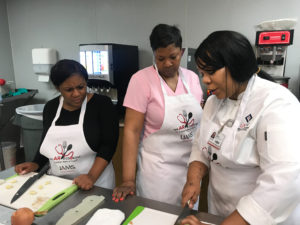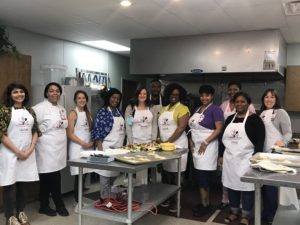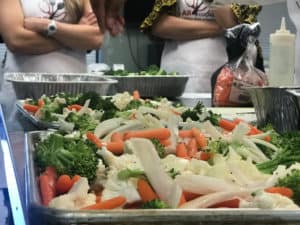May. 10, 2019 | A group of women gathered inside a commercial kitchen in Little Rock recently for a UAMS-led culinary medicine cooking class.
Culinary medicine is the practice of helping patients use nutrition and good cooking habits to restore and maintain health. UAMS is developing a culinary medicine program for health profession
students, but this is the first time a class like this has been offered to the community.
Taria Lightner, who works in UAMS nutritional services, served as the chef for the evening. She is a student at the University of Arkansas – Pulaski Technical College Culinary Arts and Hospitality Management Institute.
Laura Norman, a registered dietitian, also offered her expertise. Norman works with patients in the UAMS Fertility and Reproductive Endocrinology Clinic on Mondays and Tuesdays. She organized meal planning for the class and led nutrition discussions.
Lightner started class with the basics: emphasizing the importance of clean hands and sanitized surfaces. Then she showed the students proper techniques for chopping onions and mincing garlic.
Gloria Richard-Davis, M.D., professor and director of the Division of Reproductive Endocrinology and Infertility in the UAMS College of Medicine’s Department of Obstetrics and Gynecology, organized the class as an outreach aimed toward patients with polycystic ovarian syndrome (PCOS), a hormonal disorder that affects one in 10 women of reproductive age. It is a common and treatable cause of infertility. Richard-Davis is board certified in reproductive endocrinology and infertility. She has been working as director of the culinary medicine program.
Women with PCOS often have higher than normal insulin levels, Richard- Davis said. A diet high in refined carbohydrates can make insulin resistance more difficult to control.
A recent study showed that the DASH (Dietary Approaches to Stop Hypertension) is beneficial to patients with PCOS. The DASH diet is very similar to the Mediterranean diet, but adapted to American taste.
After the eight students practiced chopping and mincing, they separated into three groups. Each group would make one item on the menu. They prepared white fish with a chimichurri sauce, brown rice pilaf and a roasted vegetable medley.
UAMS has adopted the culinary medicine curriculum created by Timothy Harlan, M.D., executive director of the Goldring Center for Culinary Medicine at Tulane University. The Goldring Center, which opened in 2013, is the first culinary medicine center in a U.S. medical school. Since then, several schools across the country have adopted Tulane’s curriculum.
“They licensed their courseware to about 52 academic institutions,” Richard Davis said, “There was a collaborative effort among those academic institutions to do research to understand how to better teach patients the appreciation for food as medicine, or as the curriculum says ‘health meets food.’”
“Good nutrition is important to overall health,” Kaylee Lutrell, APRN, told the class. “When it comes to infertility a healthy diet is an important factor.”
Lutrell works in the fertility and endocrinology clinic with Richard-Davis. The class was one way the clinic commemorated Infertility Awareness Week.
“While a healthy diet won’t solve all infertility, it is certainly an added benefit we want all our patients to practice,” she said.
The amount of rainbow colors on a plate is another good indicator your food is nutritious, Lighten told the class.
Once the fish and vegetables were in the oven, and the rice was simmering on the stove, the women cleaned their prep areas and discussed how they could use their newly acquired knowledge.
Angel Smith of Little Rock, one of the students, lives with PCOS and is a patient of Richard-Davis. Smith has been on a weight loss journey and has changed her eating habits to include more fish and seafood.
“When I found out about this class, I thought it could give me more insight on meal ideas,” she said. “The food turned out wonderfully and has a good flavor.”



